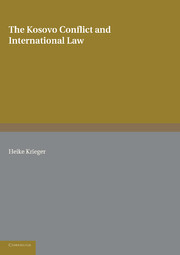Book contents
- Frontmatter
- Contents
- Map
- Preface
- Chronology
- Introduction
- Chapter 1 Kosovo's Status in Yugoslavia before 1999
- Chapter 2 Development of the Human Rights Situation pages 14 to 40
- Chapter 2 Development of the Human Rights Situation pages 41 to 64
- Chapter 2 Development of the Human Rights Situation pages 65 to 90
- Chapter 2 Development of the Human Rights Situation pages 90 to 114
- Chapter 3 Diplomatic Efforts for the Settlement of the Crisis pages 115 to 146
- Chapter 3 Diplomatic Efforts for the Settlement of the Crisis pages 147 to 187
- Chapter 3 Diplomatic Efforts for the Settlement of the Crisis pages 187 to 217
- Chapter 3 Diplomatic Efforts for the Settlement of the Crisis pages 218 to 253
- Chapter 3 Diplomatic Efforts for the Settlement of the Crisis pages 253 to 286
- Chapter 4 Military Action against Yugoslavia pages 287 to 313
- Chapter 4 Military Action against Yugoslavia pages 314 to 352
- Chapter 5 Settlement of the Crisis
- Chapter 6 Statement by NATO Memeber States
- Chapter 7 International Reactions to the Crisis pages 424 to 460
- Chapter 7 International Reactions to the Crisis pages 461 to 499
- Chapter 8 Court Action with regard to the Kosovo Crisis
- Chapter 9 Implementation of the Principles for a Political Solution of the Conflict
- Chronological List of Documents
- Select Bibliography
- Index
Chapter 2 - Development of the Human Rights Situation pages 14 to 40
Published online by Cambridge University Press: 05 July 2014
- Frontmatter
- Contents
- Map
- Preface
- Chronology
- Introduction
- Chapter 1 Kosovo's Status in Yugoslavia before 1999
- Chapter 2 Development of the Human Rights Situation pages 14 to 40
- Chapter 2 Development of the Human Rights Situation pages 41 to 64
- Chapter 2 Development of the Human Rights Situation pages 65 to 90
- Chapter 2 Development of the Human Rights Situation pages 90 to 114
- Chapter 3 Diplomatic Efforts for the Settlement of the Crisis pages 115 to 146
- Chapter 3 Diplomatic Efforts for the Settlement of the Crisis pages 147 to 187
- Chapter 3 Diplomatic Efforts for the Settlement of the Crisis pages 187 to 217
- Chapter 3 Diplomatic Efforts for the Settlement of the Crisis pages 218 to 253
- Chapter 3 Diplomatic Efforts for the Settlement of the Crisis pages 253 to 286
- Chapter 4 Military Action against Yugoslavia pages 287 to 313
- Chapter 4 Military Action against Yugoslavia pages 314 to 352
- Chapter 5 Settlement of the Crisis
- Chapter 6 Statement by NATO Memeber States
- Chapter 7 International Reactions to the Crisis pages 424 to 460
- Chapter 7 International Reactions to the Crisis pages 461 to 499
- Chapter 8 Court Action with regard to the Kosovo Crisis
- Chapter 9 Implementation of the Principles for a Political Solution of the Conflict
- Chronological List of Documents
- Select Bibliography
- Index
Summary
The Socialist Federation Republic of Yugoslavia (SFRY) was bound by human rights obligations contained in general international law and in human rights conventions. It was party to the 1966 Covenant on Civil and Political Rights, the 1966 Covenant on Economic, Social and Cultural Rights, the Genocide Convention, the Convention Against Torture and Other Cruel Inhuman or Degrading Treatment or Punishment, the Convention on the Rights of the Child, the Convention on the Elimination of Racial Discrimination and the Convention on the Elimination of All Forms of Discrimination against Women. It has signed Optional Protocol I to the Covenant on Civil and Political Rights. The FRY is still listed as party to these conventions. After the UN organs determined that Yugoslavia was not to be regarded as the automatic successor of the rights of the SFRY but would have to apply anew for membership in the UN, the FRY refused to participate in the work of the human rights treaty bodies. In a letter the chairman of the Committee on the Elimination of Racial Discrimination stated that the Committee has always considered the FRY duty bound as a state party to the International Convention on the Elimination of All Forms of Racial Discrimination.
In regard to domestic standards, the 1992 FRY Constitution provides that the FRY is a democratic state founded on the rule of law. The Constitution includes 49 articles guaranteeing basic political, civil, economic, social and cultural rights and freedom for all citizens without discrimination.
- Type
- Chapter
- Information
- The Kosovo Conflict and International LawAn Analytical Documentation 1974–1999, pp. 14 - 40Publisher: Cambridge University PressPrint publication year: 2001



